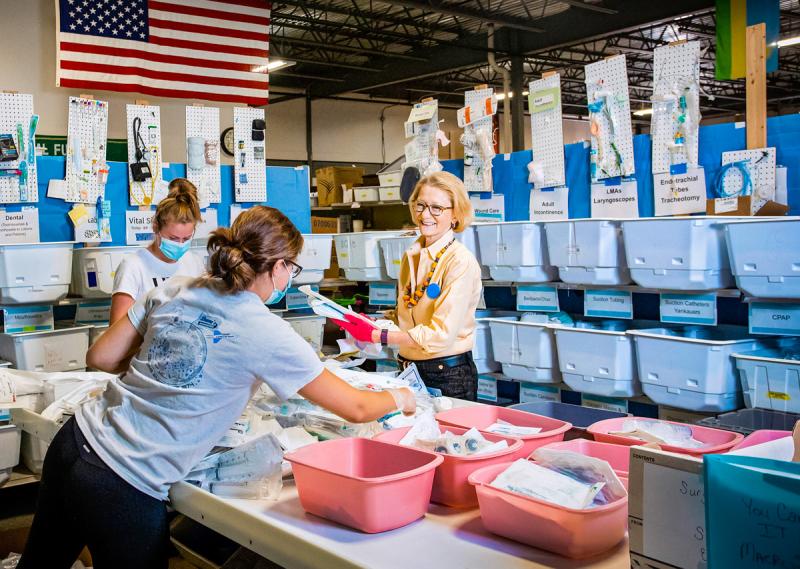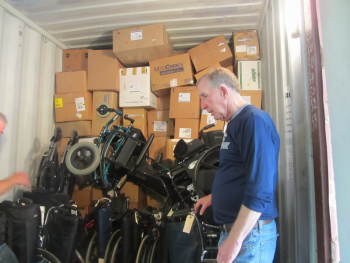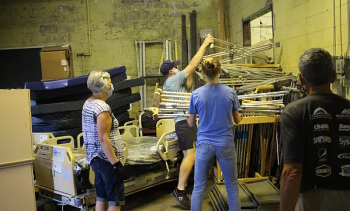Partners for World Health is a nonprofit organization founded by Elizabeth McLellan, a former Camden resident, that works to provide developing nations with needed medical supplies, medical education, and medical assistance through its work as a nonprofit.
McLellan informally launched the endeavor in 2007 after visiting a hospital in Quetta, Pakistan, while working as a nurse administrator in a Saudi Arabian trauma center. While visiting the Pakistani hospital, McLellan observed a surgeon treat a man’s wound with a used bandage and wipe his hands onto blood-stained scrubs before moving to the next patient. She also noticed that nurses were using glass syringes and reusable metal needles.
Motivated by what she witnessed, McLellan, in 2007, began collecting discarded supplies from the Maine hospital she worked for, positioning collection boxes across various departments and asking nurses and other staff to save the medical supplies from the rooms of discharged patients instead of throwing those items in the trash.
After accumulating two years worth of supplies and filling her home with medical supplies, she rented her first storage space in 2009 and organized a group of volunteers to transfer more than 11,000 pounds of medical supplies and equipment including wheelchairs, crutches, wound care materials, syringes and gowns from her home to the storage space to officially launch Partners for World Health, the only New England-based nonprofit organization collecting, repackaging and distributing medical supplies to those in need.
Since its inception, the nonprofit has collected more than two million pounds of medical supplies, saving more than 318,000 pounds in 2019 alone.
“We have enough right here in this country — in our country — that we throw away every single day,” said McLellan, who noted the United States should have a national program collecting medical supplies.
The work of the organization limits the impact on the environment through a diversion of materials from landfills, lowers healthcare costs by lowering disposal fees, and provides healthcare resources to individuals in need.
The organization works to improve health conditions by sending medical personnel on medical missions to the developing world, while also educating individuals about health issues impacting global communities.
Requests are fielded daily by the organization for medical supplies and equipment across Maine and the New England region, particularly amid the pandemic, as individuals find it difficult to afford the items they need for medical assistance.
“These requests come from many avenues, including home health care workers aiding patients, elderly individuals, social service organizations, and new Mainers looking for personal care items,” says the PWH team, which noted the organization is able to provide the equipment for little to no cost. “Often an individual will come looking for one item and leave with a car full of much needed supplies after we learn they need so much more.”
Amid the pandemic, Partners for World Health has balanced its international commitments while also assisting the medical communities across the New England region and New York by providing personal protective equipment and loaning ventilators, beds, IV poles, IV pumps for use by healthcare workers and first responders.
Partners for World Health estimates $10 billion is spent in disposal fees by hospitals across the country through the discarding of more than five million tons of supplies, equipment and trash.
Before the COVID-19 pandemic, the organization held six or seven medical missions each year to developing countries to provide surgical and primary healthcare services as well as offer skilled training and educational opportunities for nurses, nursing students and local residents. (Once a pandemic was declared by the United States government in March 2020, McLellan canceled a slate of 2020 medical missions.)
Organizing the trips in partnership with local hospitals and clinics, Partners for World Health also delivers thousands of pounds of medical supplies and equipment to those in need, while providing medical assistance and services for free.
People come from all around the country Partners for World Health is working in at the time, McLellan noted, for free medical services with many individuals showing up with major untreated deformities, club feet and elephantiasis — medial issues either not seen in the United States or that would have been corrected early on.
“When you grow up and you’re an adult with club feet, you can’t walk,” said McLellan of children that continue to suffer from club feet as an adult. “So how do you get to a job? You’re pushing yourself around on a skateboard because you don’t have a wheelchair.”
The 2021 slate of medical missions was scheduled to include a January trip to Uganda, a February trip Liberia, a March visit to Bangladesh and an April visit to Malawi, each of which has been scrapped due to the pandemic.
As of now, McLellan is hoping her team can travel to Senegal in May, depending on if its volunteers can receive vaccines prior to scheduled departure. If all goes well, Partners for World Health will round out 2021 with trips to Ethiopia in August, Bangladesh in October and South Sudan in November.
As part of the medical missions, McLellan and her team has been running a program since 2015 or 2016 called Project 10,000, an effort to reduce maternal and infant mortality rates in Africa by providing 10,000 women with the education needed to understand possible complications of pregnancy, when to seek help, and skills to pass along this knowledge to others within their communities.
“Many women and their newborns die from complications, such as prolonged labor and eclampsia, prior to delivery,” according to Partners for World Health.
McLellan and her team wants its intervention efforts to lower the amount of unsuccessful pregnancies than would be predicted by the current infant mortality rate in Africa, which is about 53 infant deaths per 1,000 live births. In fact, 5.2 percent of infants in Africa die before reaching the age of one, and many women and infants die from pregnancy complications such as prolonged labor and eclampsia prior to delivery.
The odds of women dying from complications during pregnancy and child birth in Africa is 1 in 20, compared to 1 in 6,250 for women in the United States.
Partners for World Health, on select medical missions, provides birthing kits to participating women — ultimately, the number will be 10,000 when the campaign’s goal is achieved — that include items to ensure babies are kept warm and dry after birth and a beanie baby as a gift. The kits also provide essential items not provided by African hospitals — sterile gloves, scissors, cord clamps, and others — the mothers give to their midwife that the mothers otherwise would be unable to provide to the midwife due to financial constraints.
The project, which began in Senegal before moving to Uganda and is now headed for South Sudan if the team can travel there this year, also sees the Partners for World Health team conduct interviews with participating women to collect data and understand their situations, particularly health and well-being related, as pregnant mothers in an African nation.
McLellan noted the team usually conducts 350 to 400 interviews per Project 10,000 trip, and that the organization has educated 2,496 women across Senegal and Uganda, nearly 25 percent of its goal to educate 10,000 women. (If the pandemic did not disrupt the organization’s 2020 medical missions, McLellan estimated the total would be over 4,000 individuals, or approximately 40 percent of its goal.)
Armed with a bevy of data, and more forthcoming, McLellan and her team is focused on applying for a $250,000 grant that would allow Partners for World Health to offer the benefits of Project 10,000 on a monthly basis to pregnant women in Uganda.
If the organization receives the grant money, Partners for World Health would be able to provide training to community health workers in Uganda to implement the program, gather more data, conduct more interviews, educate pregnant women and supply birthing kits to pregnant women.
Partners for World Health will be holding a pair of fundraising events this year to support its endeavors.
Its inaugural art auction May 3 will feature paintings, sculptures, jewelry and prints from artists around the state and the world.
After canceling its annual international handicraft fair in 2020 due to the pandemic, the organization anticipates bringing the event back to the parking lot of its Portland headquarters July 17 with the sale of 2,000 handicraft items, including 400 baskets purchased from a group of women in Uganda during a Partners for World Health medical mission.































